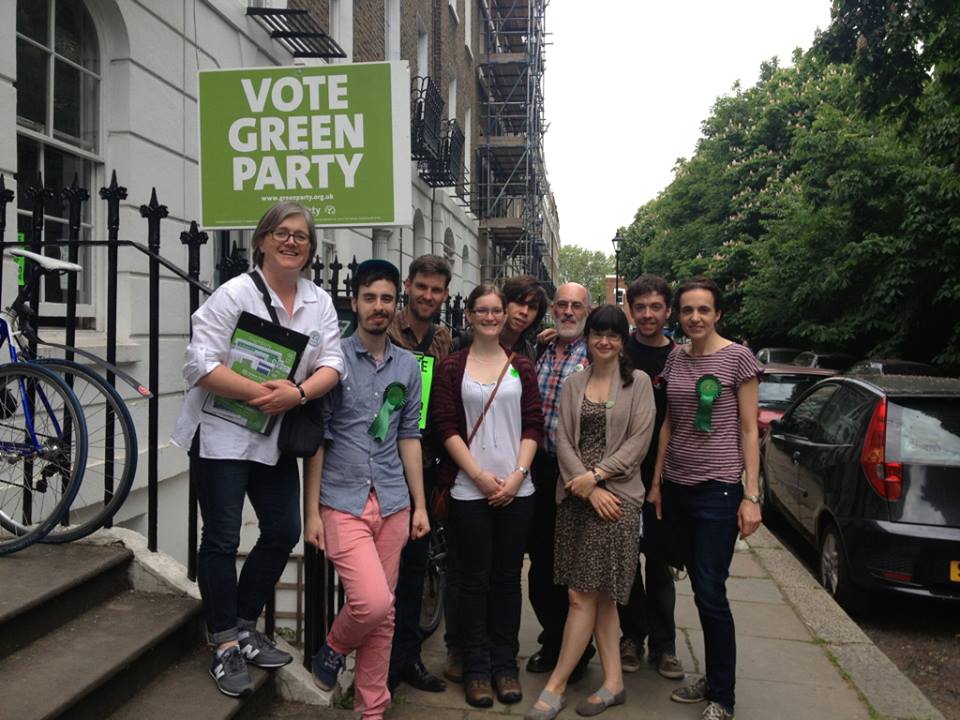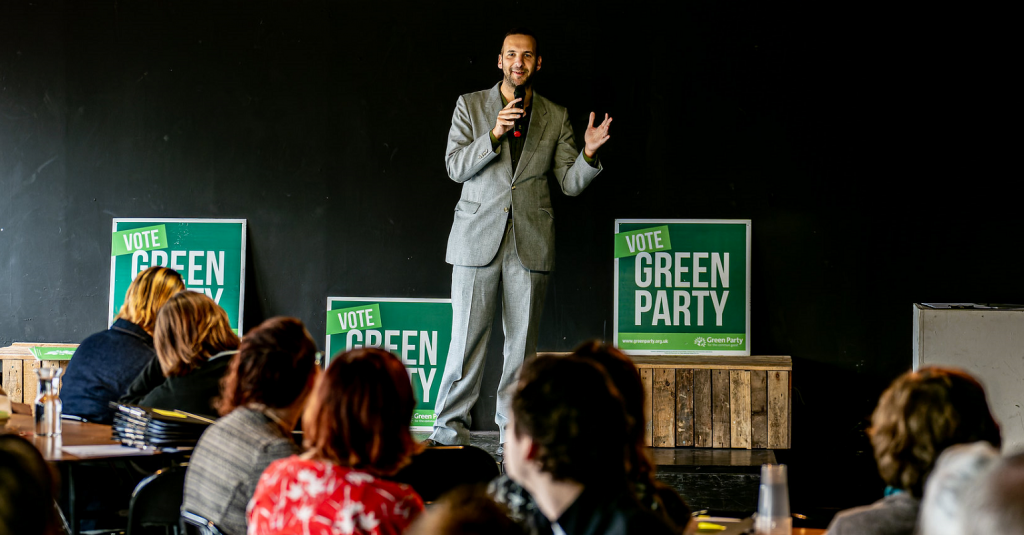What we do (and don’t) need from our new leadership team

Natalie Bennett’s standing down as lead of the Green Party of England and Wales, after four years of tireless work, should be a time to take appraisal. The idea of leadership has often been met with scepticism in the party, at this time we should take stock of what we do and don’t need from our new leadership team in 2016.
We DO need a media professional at the top
Undoubtedly our new leader must an able media performer, and indeed the point has been overly belaboured by the press. Many of our potential leadership candidates already have a track record of handling national press. Caroline Lucas of course needs no introduction. Amelia Womack during the last General Election covered a number of press events and comes fresh from a Welsh Assembly election. Jonathan Bartley, Andrew Cooper and Shahrar Ali too featured in televised debates during the GE.
For those that have a record their performance should be scrutinised. For those that do not have a track record we shouldn’t be afraid to ask whether they are battle-hardened enough.
We DO need someone who understands elections
Over optimistic predictions of Green success has been unfortunately a feature of the Green Party for a while. Whilst such proclamations do generate headlines they ultimately result in disappointed supporters, dejected donors and deflated volunteers. We need a leader who will put forward realistic markers of Green success (with a clear pathway to how they can be achieved)
On a broader point we do need a leadership team who understands the hard work, the strategy and tactics that go into winning elections. Our leadership team can and should be evangelists for best practice in the party and need to get parties on board with target to win. Beyond that we need to start looking seriously at lessons from Caroline Lucas’ successful Brighton campaign and the role community organising, snowflake team models and new tech has in the party.
Caroline has of course now triumphed twice in Brighton. Jonathan Bartley masterminded the return of the Green Party to Lambeth council. Andrew Cooper has been repeatedly returned to Kirkless Borough Council. It is not unreasonable to ask other candidates what experience they have of successful elections and why they do not already hold elected office.
We DO need a team of people who either are elected or can be elected soon
The requirement of candidates to be elected does of course shrink the pool of potential candidates for Green leader. Not being elected shouldn’t be an automatic excluder but all of our leadership team SHOULD have realistic chance of being elected to office soon. We did try valiantly this year with Amelia in Wales and Shahrar in London, but it’s clear that for the office of Deputy Leader particularly that holding elected office is seen as a requirement in the media for coverage.
2017 offers the opportunity for a candidate to be elected as a county councillor. 2018 as a councillor too. 2019 is our first next national election, with the opportunity for candidates to rise up to MEP. For 2020 we are currently in second place in Bristol West, Sheffield Central, Manchester Gorton & Liverpool Riverside. Do we actually need a leadership team with genuine connections to one of those potential target seats?
We DO need a team player
Very clearly the Green Party has decided it wants a team of leaders. We’ve always been sceptical of a top down model of leadership as purported by the mainstream, so for that to work we clearly need collaboratively spirited team players. Candidates who can evidence examples of successful team working and building should be prioritised.
We DO need an active and energetic leadership team
Time and time again the tireless energy and effort that Natalie Bennett put into the leadership role is rightly applauded. Indeed her successor faces a steep climb (possibly also a number of train rides, bus journeys and long walks) to follow in her footsteps. Some of the potential candidates have tirelessly followed that example, taking on local visits and getting out into the regions to support local parties. Candidates should be able to evidence the hard work they’ve put into the party, and the energy they will put into their prospective role.
Most of all we need an energetic and leadership campaign. Frankly the last contested deputy leadership election was lacklustre. It missed the energy and dynamism evidenced in 2012. Candidates should be attending scores of hustings. Their supporters should be out building a campaign nationally. Social media should be abuzz with their proposals and their energy. Perhaps even if we’re lucky their ideas should be generating (positive) national press. A candidate who is not running that sort of campaign is not the next leader.
We DON’T need a gaffe maker
Many of our candidates already have a media profile. A track record of poorly put together remarks or comments should at this early stage be seen as a disqualifier.
We DO need a strategy and a campaign builder
Natalie did a sterling job of defining the party as a radical alternative to Labour. Countless causes Natalie became a champion of and hearing her speak became an expected feature of so many campaigns and rallies. Hearing Natalie speak on the issues of migration, sex work or the right to choose particularly were an inspiration.
In an age of a Corbyn led Labour and a Lib Dem brand that is slowly trying to detoxify we now more than ever need a leader who has a clear message and focus. Leadership candidates, in this forthcoming battle, need to highlight which parts of the party policy need highlighting the most. Which will offer the cut through and distinctiveness to the mainstream? Can they build successful and high profile campaigns?
Caroline Lucas’ battle for a fracking-free Balcombe and Jenny Jones campaign against police surveillance offer prime examples. Can any of our prospective candidates build similar campaigns?
We DO need diversity
The election of Shahrar Ali as deputy leader marked a breakthrough for UK politics, as the first elected deputy BME leader of any party. Whatever the outcome of the leadership election it would be a huge step back to return all white, straight, middle class and able bodied leadership team. Diversity comes in many forms and a candidate who can talk compellingly about how they are not the stock cupboard standard candidate should start with a lead.
We DO need someone who understands how the party is run
The party’s executive council and regional council are the two bodies responsible for the party’s running, strategy and wellbeing. Despite their power quite often knowledge about their workings or even their existence is quite often low amongst membership. All three of the leadership team automatically become members of the executive council. Having some working knowledge of how the party works has to be an integral requirement for any leadership candidate and indeed any candidate should have some prior experience of being on (or at least experience of working with) one of these committees.




Are you saying there are people now in the running who are disqualified by previous media gaffes? Who and what, exactly?
If we must play this game [set by the media] where we have to have a ‘leader’, can we not be a bit more nuanced about it?
I was not a member when the decision was made to have a leader, but the idea does seem so incongruous in such a democratically structured party.
Can we just say to the outside world, struggling to get their heads around bottom up structures, ‘Ok, this person is our ‘leader’.
But then, within the party that person always be referred to as ‘Chief Party Spokesperson’.
Just so as to ensure that everyone , including the person fulfilling that post, is reminded of the main role of the job.
This is absolutely the right time for appraisal: reflection and recognition of what’s needed.
Getting the Message out is primary goal and, perhaps, that’s not always been done as effectively as it could have been. (About the only thing that could be learned from UKIP).
Are the media only interested in having representatives elected to public office as interviewees? Is there merit in utilizing the MP, 2 AMs and 3 MEPs as de-facto Speakers; available for all TV and press pieces? Furthermore, does the leadership need to be selected from those who already hold public office? Should it be part of the person spec for the posts?
If the media isn’t always the Green Party’s friend then, in our technological age, shouldn’t the Green Party be using websites, blogs, web-casts, YouTube channels to much greater effect? (The Green Party News feed doesn’t even have an RSS feed, for example. The conferences are only web-cast to members of the party – and that in itself is only a recent development).
The Green Party appoints shadow-spokespeople who then never really seem to say anything! Are these just puff-posts? Why aren’t they speaking on matters of Green importance of the day? Setting a Green agenda? Greenpeace recently scaled Nelson’s column, and protested about BP’s involvement in the Arts: neither received much comment from the relevant spokespeople. :/
I realize that the posts are set for the forthcoming election, but
– with an elected GPEx in place and
– the party defining the direction,
does the party really need a leader and 2 deputies at all?
So to pick up on the spokespeople point many times spokespeople do produce comments for news articles but quite often the media is not interested in running a line on what the Green Party spokesperson for X said. Spokespeople need to be campaigners who instigate coverage that can’t be ignored.
It’s partly why these roles are best given to those with elected office so their work can help shape campaigns and make them seem as an authority on X.
I’d say we absolutely do need a leader. The UK media has shown time and again it needs a focal point for it’s attention. Deputy leaders are there to provide cover and help provide much more of the internal organisation.
Your paragraphs 1 and 2 are saying what I was saying:
– elected office gives gravitas
– if the media aren’t interested, find an alternative medium for the message.
The other point persists: is there an overlap between GPEx and the leadership?
Very good points, I agree with all of them.
I think the point that we are electing a leadership *team* is very important. They will also be part of an executive team. We are unlikely to get every quality we could like in the leader, but we can hope to form a really effective team.